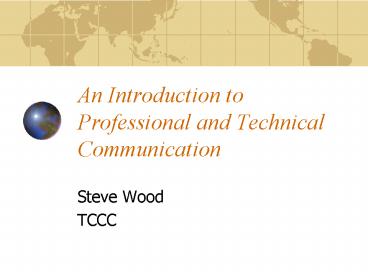An Introduction to Professional and Technical Communication PowerPoint PPT Presentation
1 / 15
Title: An Introduction to Professional and Technical Communication
1
An Introduction to Professional and Technical
Communication
- Steve Wood
- TCCC
2
Communication in the Workplace
How important are communication skills, including
writing, in the workplace?
According to a major report prepared by the US
Dept. of Labor in 1992, there are five essential
areas of competence necessary for success in the
workplace.
3
Going 5/5
All five areas involve communication.
4
SCANS Report
5
Changes Affecting the Workplace
- Heightened global competition
- Technology and changing political realities mean
that businesses often face non-traditional
competition (not just the business down the
street). - Flattened management hierarchies
- Middle management has been downsized or
eliminated. - Expanded team-based management
- Many businesses have changed their management
style.
From McGuffeys Business Communication
6
Changes Affecting the Workplace
- New work environments
- Technology has also changed the environment in
which business is conducted. - Increasingly diverse workforce
Success in the new workplace requires excellent
communication skills.
From McGuffeys Business Communication
7
The Communication ProcessBasic Model
From McGuffeys Business Communication
8
Definition of Communication
- For our purposes, communication is the
transmission of information and meaning from one
individual or group to another.
9
The Communication ProcessExpanded Model
From McGuffeys Business Communication
10
Additions to the Model
- The preceding definition and model do leave out
several important points, however. - Communication involves the use of symbols.
- Communication happens on a number of channels,
not usually on a single one. - Noise is a part of the communication process that
must often be overcome.
11
Communication involves the use of symbols.
- The transmission of information and meaning does
not take place directly it takes place via a
symbolic medium. - Spoken language, written language, visual aids
like pictures or diagrams, gestures, body
language, tone of voice --- all of these can be a
symbolic medium to convey meaning.
12
The Sign
- Saussure once defined language as a system of
signs. - A sign consists of two parts 1) the concept or
definition and 2) the sound-image (the group of
sounds that make up a word). - For example, the sign BOOK is composed of the
concept of a book that we have acquired at some
point in our lives and the sound-image that
contains the three sounds that make up the word
book.
13
The Sign
- We can communicate with one another because we
share a particular system of signs (we speak the
same language and understand many of the same
cultural references).
14
Communication happens on a number of channels,
not usually on a single one.
- When we speak to one another, for example, there
is the channel of the words spoken, but there are
other channels including the tone of voice, eye
contact, and body language.
15
Noise is a part of the communication process that
must often be overcome.
- Noise is any obstacle that threatens to obscure
the message. - It can be actually physical noise, but it can
also be a psychological or physiological issue. - For example, if you are really worried about
someone or are very tired, it may make it
difficult to listen to a class lecture or
communicate effectively with a family member.

